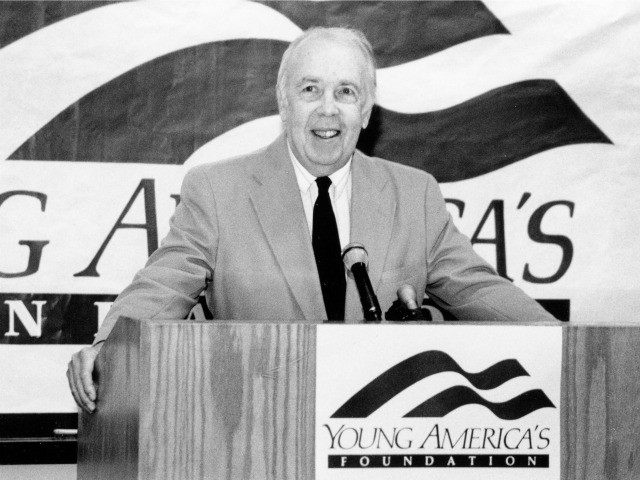With a twinkle in his eye, Stan liked to tell liberals that he never really liked Nixon until Watergate. Or that he didn’t care much for what Joe McCarthy was trying to accomplish, he just liked his methods.
One of the giants of the conservative movement, M. Stanton Evans died this week, at 80, after a long bout with cancer. His contribution to the conservative cause was so extensive, the people he trained such a long list, the books and articles he wrote, the jokes he told, and the friends he made so great that it would take pages and pages to recount.
Evans followed Bill Buckley as editor of the Yale Daily News and went from there to the Indianapolis News, where he became the youngest editor of a major daily in America. He told me once that on is first day on the job the editor told him he’d be writing the paper’s editorials. Stan reacted with euphoria, convinced that he would be able to change the way Indianapolis functioned in no time. “Don’t get too excited,” the editor told him. “It’s sort of like wetting your pants in a blue wool suit. It makes you feel better, but nobody knows the difference.”
In 1960, on his way to the founding meeting of Young Americans for Freedom at the Buckley family estate in Sharon, Connecticut, one of the first national conservative activist organizations, Evans drafted a manifesto for the group which became known as the Sharon Statement and remains to this day one of the foremost and succinct statements of conservative principles. Said the New York Times, in its obituary of Evans, “More than a manifesto for young conservatives, the document proved to be a seminal document in bringing different kinds of conservatives together.”
Evans founded the National Journalism Center, where he trained thousands of young writers how to write, how to gather and use facts, and how to be good journalists. To say that Stan had launched many careers would be an understatement.
Stan Evans was a powerful writer in his own right. His first book, Revolt on the Campus, published in 1961, recounted the emerging growth of conservatism in the colleges. Probably premature – in 1961 there were not many of us on campus – the book gave hope to the few that existed and encouraged the growth of conservatism among students and young people. Stan had joined the board of trustees of the Intercollegiate Studies Institute soon after it was founded in the early 1950s, and remained a trustee until last year.
The Theme is Freedom: Religion, Politics and the American Tradition, published by Regnery in 1994, was one of his most serious efforts. The book, Stan wrote in the introduction, “is an effort to trace, conceptually and as a matter of historical fact, the nexus between religious values and the rise of our political system.” Everything we learned in school on the question of the influence that religious values had on the development of western culture, and on the founding and flourishing of America, was wrong, according to Evans, and he saw it as his job to set the record straight. The book was widely reviewed and praised, and was adopted as a text in college courses across the country.
His two last books were, in a way, the culmination of his life-long work. Blacklisted by History: The Untold Story of Senator Joe McCarthy and His Fight Against America’s Enemies, published in 2007, set out to show that McCarthy had actually rooted out many subversives, in the State Department and elsewhere in the government, and that much of what he alleged was actually correct. It was vintage Stan Evans, and the sort of thing that gave him no small delight: take on a cause that is sacred to the left and demolish it with facts that others had left buried. I used to talk to Stan often when we was writing the book, and he would recount how he would go from archive to archive, looking for materials to make his case, and how often the archives had been raided by lefties, the subject of McCarthy’s accusations, and stolen away, a la Sandy Berger, so the truth would never be known. But Stan, the indefatigable researcher that he was, would go to another archive, another collection, another library, and almost always find what he was looking for.
Stalin’s Secret Agents: The Subversion of Roosevelt’s Government, published in 2012, written with Herb Romerstein, was Stan’s last book and capped his reputation as one of the great researchers on Communism and the Cold War. Digging into the massive infiltration by Soviet agents and fellow-travelers into the FDR government, the book demonstrated, with prodigious research, how that subversion resulted in significant influence over US foreign policy and our impotent resistance to Soviet control of post-war Eastern Europe. Stan was very pleased to be able to tell his critics, “I told you so.”
The conservative cause has lost one of its great warriors. But as Stan would probably quip, “no need to find grief counsellors to help us, just get on with the fight.”

COMMENTS
Please let us know if you're having issues with commenting.